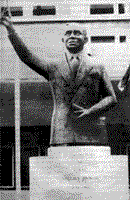Isaac Wallace-Johnson
| Isaac Theophilus Akunna Wallace-Johnson | |
|---|---|

Statue of I. T. A. Wallace-Johnson in Sierra Leone
|
|
| Personal details | |
| Born | 1894 Wilberforce, Freetown, Sierra Leone |
| Died | 10 May 1965 Ghana |
| Nationality | Sierra Leone |
| Political party | West African Youth League |
| Other political affiliations |
United People's Party, United Sierra Leone Progressive Party |
| Occupation | trade unionist, journalist, activist, and politician |
Isaac Theophilus Akunna Wallace-Johnson (1894 – 10 May 1965) was a Sierra Leonean and British West African workers' leader, journalist, activist and politician. Born into a poor krio family in Sierra Leone, he emerged as a natural leader in school. After attending United Methodist Collegiate School for two years, he dropped out and took a job as an officer in the customs department in 1913. He was dismissed for helping organize a labour strike, but later reinstated to his position a year later. After resigning from his job, he enlisted as a clerk with the Carrier Corps during World War I. After being demobilised in 1920, Wallace-Johnson moved from job to job, before settling as a clerk in the Freetown municipal government. He claimed to have exposed a corruption scandal, which resulted in the incarceration of top officials, including the mayor. After being fired from this job in 1926, he left Sierra Leone and became a sailor. He joined a national seamen union and it is believed that he also joined the Communist Party. In 1930, he helped form the first trade union in Nigeria and attended the International Trade Union Conference of Negro Workers in Hamburg, where he established a number of contacts. He published articles and edited the Negro Worker, a journal devoted to uniting black workers around the world. He travelled to Moscow, where he claimed to have attended classes on Marxism-Leninism theory, union organisation and political agitation.
Within a few months of returning to Nigeria in 1933, he was deported by authorities for his illicit trade union activities. He travelled to the Gold Coast, where he quickly established himself as a political activist and journalist. An agitator, he managed a fund to finance the appeal of the nine African Americans given the death penalty in the Scottsboro case and also campaigned for legislation on workers' compensation and strict safety regulations after the deadly Prestea mining disaster of June 1934. In his writings during this era, Wallace-Johnson glorified the Communist government of the Soviet Union and expressed his disdain for capitalist societies. Soon, the colonial government passed the Sedition Act, a piece of legislation prohibiting the importation of "seditious" literature, which included works from the Negro Worker. In 1934, Wallace-Johnson became the subject of scathing articles in the Gold Coast Independent, in which he was accused of ruining the political atmosphere in the country. After meeting Nnamdi Azikiwe in 1935, he formed the West African Youth League, an organisation dedicated to obtaining more liberties and privileges for the Gold Coast population. Wallace-Johnson and the WAYL entered the Gold Coast political scene by supporting Kojo Thompson in his successful candidacy in the Legislative Council elections of 1935. During the Second Italo-Abyssinian War, Wallace-Johnson and the WAYL vocalised their harsh sentiments toward European imperialism and helped establish the Ethiopian Defense Fund with the purpose of educating the populaces on matters of national and racial importance. In 1936, Wallace-Johnson was arrested for sedition after publishing an article in the African Morning Post condemning Christianity, European civilisation and imperialism. The colonial governor proposed that he be deported in lieu of being put on trial. After Wallace-Johnson accepted this offer, the governor went back on his word and had the political activist placed on trial in front of the Assize Court. Wallace-Johnson travelled to London to appeal his conviction and to also establish connections for the WAYL.
...
Wikipedia
